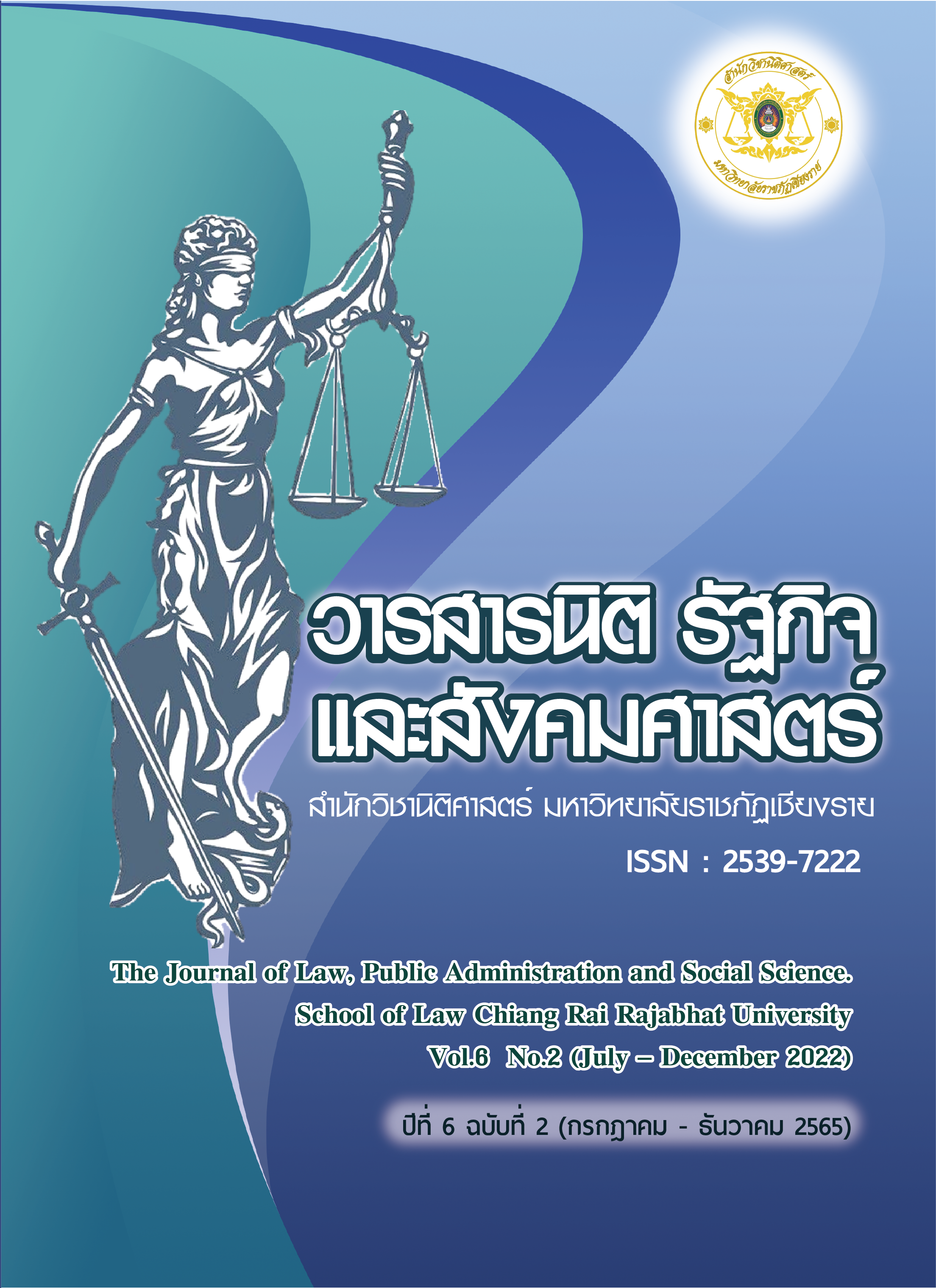Discrimination of person with a prison background in case of government career application.
Main Article Content
Abstract
In present, once a person spent time in prison, even when the sentence is completed. Such person would be prohibited from government jobs application. There were 2 related cases as follows;
- Ineligibility regarding prison background (Not yet applied for clean slate law).
- Ineligibility regarding, first, unacceptable immorality and behavior other than criminal offences, second, unacceptable immorality and behavior because of an imprisonment background (Clean slate law applicable but this ineligibility was not removed altogether according to supreme administrative court precedence อ.2099/2559).
Considering constitutional human rights, when a person commits a crime and complete the penalty. Such person should not be stigmatized by the already repented offences. If Capital punishment of jail time purpose was to redeem a person. But when such person spent full time in prison an has been restored back to the society, public career was prohibited from them because of the imprisonment background. Such limitation will prevented a person to be completely integrated back to the society as an upstanding citizen.
Article Details
References
คณิต ณ นคร. กฎหมายอาญาภาคทั่วไป. พิมพ์ครั้งที่ 3, กรุงเทพฯ: วิญญูชน, 2551.
“คำอธิบายสรุปสาระสำคัญ พระราชบัญญัติล้างมลทินในโอกาสสมโภชกรุงรัตนโกสินทร์200 ปี พ.ศ. 2526.” http://web.krisdika.go.th/data/outsitedata/article77/filenew/10.2.4.1.pdf, สืบค้นเมื่อวันที่ 6 มีนาคม 2565.
ธานินทร์ กรัยวิเชียร. คำแนะนำนักศึกษากฎหมาย กฎหมาย-การศึกษาและการสอน. พิมพ์ครั้งที่ 5. กรุงเทพฯ: สำนักพิมพ์มหาวิทยาลัยธรรมศาสตร์, 2557.
นพมาศ อุ้งพระ(ธีรเวคิน). จิตวิทยาสังคม. พิมพ์ครั้งที่ 1. กรุงเทพฯ: สำนักพิมพ์มหาวิทยาลัยธรรมศาสตร์, 2553.
บรรเจิด สิงคะเนติ. หลักพื้นฐานสิทธิเสรีภาพและศักดิ์ศรีความเป็นมนุษย์. พิมพ์ครั้งที่ 6. กรุงเทพฯ: วิญญูชน, 2562.
เปี่ยมสุข นาคทอง. “ปัญหากฎหมายเกี่ยวกับการจำกัดสิทธิของผู้เคยต้องโทษจำคุกในการรับราชการ: ศึกษากรณีข้าราชการพลเรือนสามัญ.” วิทยานิพนธ์หลักสูตรมหาบัณฑิต สาขาวิชานิติศาสตร์ คณะนิติศาสตร์ปรีดี พนมยงค์ มหาวิทยาลัยธุรกิจบัณฑิตย์,กรุงเทพฯ, 2556.
พเยาว์ ศรีแสงทอง. การลงโทษและการแก้ไขผู้กระทำผิด. พิมพ์ครั้งที่2. กรุงเทพฯ: จามจุรีโปรดักส์, 2555.
สมฤดี ธัญญสิริ. “ลักษณะต้องห้ามการเป็นข้าราชการตำรวจ ... กรณีเป็นผู้ประพฤติเสื่อมเสีย !.” https://www.admincourt.go.th/admincourt/upload/webcms/Academic/Academic_120717_110626.pdf. สืบค้นเมื่อ 3 มีนาคม 2565.
อุนิษา เลิศโตมรสกุล. อาชญากรรมและอาชญาวิทยา. พิมพ์ครั้งที่ 2. กรุงเทพฯ: โรงพิมพ์แห่งจุฬาลงกรณ์มหาวิทยาลัย, 2561.
อานนท์ ชวาลาวัณย์. “อุปสรรคชีวิตอดีตนักโทษ: ฟ้าหลังฝนไม่สดใสเสมอไป.” 4 เม.ย. 2557. https://ilaw.or.th/node/3079. สืบค้นเมื่อ 6 มีนาคม 2565.
พจนานุกรมออนไลน์,ราชบัณฑิตยสถาน,https://dictionary.sanook.com/search/
dict-th-th-royal-institute/%E0%B8%95%E0%B8%A3%E0%B8%B2%E0%B8%9A%E0%B8%B2%E0%B8%9B,สืบค้นเมื่อวันที่ 10 พฤษภาคม 2565.


